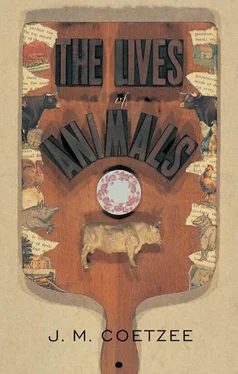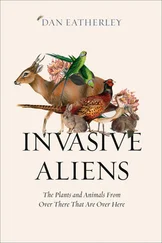In the pages that follow, philosophers and poets, novelists and scientists, deans and presidents, parents, children, and friends all grapple with how human beings should treat animals and should treat one another in the midst of the deep disagreement that will no doubt continue to brew over this issue for some time to come. Coetzee’s story ends with the ambiguously consoling words that Costello’s son voices to his aging mother, “There, there, it will soon be over.” By contrast, these moral matters will not soon be over. They remain ever more disconcerting, in no small part owing to the words of Coetzee’s characters.
THE LIVES OF ANIMALS
♦
J. M. Coetzee
The Philosophers and the Animals
♦
HE IS WAITING at the gate when her flight comes in. Two years have passed since he last saw his mother; despite himself, he is shocked at how she has aged. Her hair, which had had streaks of gray in it, is now entirely white; her shoulders stoop; her flesh has grown flabby.
They have never been a demonstrative family. A hug, a few murmured words, and the business of greeting is done. In silence they follow the flow of travelers to the baggage hall, pick up her suitcase, and set off on the ninety-minute drive.
“A long flight,” he remarks. “You must be exhausted.”
“Ready to sleep,” she says; and indeed, en route, she falls asleep briefly, her head slumped against the window.
At six o’clock, as it is growing dark, they pull up in front of his home in suburban Waltham. His wife Norma and the children appear on the porch. In a show of affection that must cost her a great deal, Norma holds her arms out wide and says, “Elizabeth!” The two women embrace; then the children, in their well-brought-up though more subdued fashion, follow suit.
Elizabeth Costello the novelist will be staying with them for the three days of her visit to Appleton College. It is not a period he is looking forward to. His wife and his mother do not get on. It would be better were she to stay at a hotel, but he cannot bring himself to suggest that.
Hostilities are renewed almost at once. Norma has prepared a light supper. His mother notices that only three places have been set. “Aren’t the children eating with us?” she asks. “No,” says
Norma, “they are eating in the playroom.” “Why?”
The question is not necessary, since she knows the answer. The children are eating separately because Elizabeth does not like to see meat on the table, while Norma refuses to change the children’s diet to suit what she calls “your mother’s delicate sensibilities.”
“Why?” asks Elizabeth Costello a second time.
Norma flashes him an angry glance. He sighs. “Mother,” he says, “the children are having chicken for supper, that’s the only reason.”
“Oh,” she says. “I see.”
His mother has been invited to Appleton College, where her son John is assistant professor of physics and astronomy, to deliver the annual Gates Lecture and meet with literature students. Because Costello is his mother’s maiden name, and because he has never seen any reason to broadcast his connection with her, it was not known at the time of the invitation that Elizabeth Costello, the Australian writer, had a family connection in the Appleton community. He would have preferred that state of affairs to continue.
Elizabeth Costello is best known to the world for The House on Eccles Street (1969), a novel about Marion Bloom, wife of Leopold Bloom, which is nowadays spoken of in the same breath as The Golden Notebook and The Story of Christa T as pathbreaking feminist fiction. In the past decade there has grown up around her a small critical industry; there is even an Elizabeth Costello News-letter , published out of Albuquerque, New Mexico.
On the basis of her reputation as a novelist, this fleshy, white-haired lady has been invited to Appleton to speak on any subject she elects; and she has responded by electing to speak, not about herself and her fiction, as her sponsors would no doubt like, but about a hobbyhorse of hers, animals.
John Bernard has not broadcast his connection with Elizabeth Costello because he prefers to make his own way in the world. He is not ashamed of his mother. On the contrary, he is proud of her, despite the fact that he and his sister and his late father are written into her books in ways that he sometimes finds painful. But he is not sure that he wants to hear her once again on the subject of animal rights, particularly when he knows he will afterwards be treated, in bed, to his wife’s disparaging commentary.
He met and married Norma while they were both graduate students at Johns Hopkins. Norma holds a Ph.D. in philosophy with a specialism in the philosophy of mind. Having moved with him to Appleton, she has been unable to find a teaching position. This is a cause of bitterness to her, and of conflict between the two of them.
Norma and his mother have never liked each other. Probably his mother would have chosen not to like any woman he married. As for Norma, she has never hesitated to tell him that his mother’s books are overrated, that her opinions on animals, animal consciousness, and ethical relations with animals are jejune and sentimental. She is at present writing for a philosophy journal a review essay on language-learning experiments upon primates; he would not be surprised if his mother figured in a dismissive footnote.
He himself has no opinions one way or the other. As a child he briefly kept hamsters; otherwise he has little familiarity with animals. Their elder boy wants a puppy. Both he and Norma are resisting: they do not mind a puppy but foresee a grown dog, with a grown dog’s sexual needs, as nothing but trouble.
His mother is entitled to her convictions, he believes. If she wants to spend her declining years making propaganda against cruelty to animals, that is her right. In a few days, blessedly, she will be on her way to her next destination, and he will be able to get back to his work.
On her first morning in Waltham, his mother sleeps late. He goes off to teach a class, returns at lunchtime, takes her for a drive around the city. The lecture is scheduled for the late afternoon. It will be followed by a formal dinner hosted by the president, in which he and Norma are included.
The lecture is introduced by Elaine Marx of the English Department. He does not know her but understands that she has written about his mother. In her introduction, he notices, she makes no attempt to link his mother’s novels to the subject of the lecture.
Then it is the turn of Elizabeth Costello. To him she looks old and tired. Sitting in the front row beside his wife, he tries to will strength into her.
“Ladies and gentlemen,” she begins. “It is two years since I last spoke in the United States. In the lecture I then gave, I had reason to refer to the great fabulist Franz Kafka, and in particular to his story ‘Report to an Academy,’ about an educated ape, Red Peter, who stands before the members of a learned society telling the story of his life—of his ascent from beast to something approaching man.{Cf. J. M. Coetzee, “What Is Realism?” Salmagundi , nos. 114–15 (1997): 60–81.} On that occasion I felt a little like Red Peter myself and said so. Today that feeling is even stronger, for reasons that I hope will become clearer to you.
“Lectures often begin with lighthearted remarks whose purpose is to set the audience at ease. The comparison I have just drawn between myself and Kafka’s ape might be taken as such a lighthearted remark, meant to set you at ease, meant to say I am just an ordinary person, neither a god nor a beast. Even those among you who read Kafka’s story of the ape who performs before human beings as an allegory of Kafka the Jew performing for Gentiles{Cf. Frederick R. Karl, Franz Kafka (New York: Ticknor & Fields, 1991), 557–58.} may nevertheless—in view of the fact that I am not a Jew—have done me the kindness of taking the comparison at face value, that is to say, ironically.
Читать дальше












